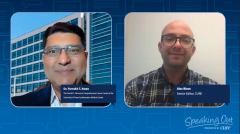
With CLL ‘Cancer Gets Smart, And We Have to Evolve with the Cancer’
There have been major treatment advancements for CLL in the last decade, with future generations of drugs on the horizon.
When it comes to the treatment of chronic lymphocytic leukemia, or CLL, there have been numerous advances in the last decade as providers have moved completely away from chemotherapy in the vast majority of patients, as one expert explained in an interview with CURE®.
Appearing as part of the “Speaking Out” interview series, Dr. Farrukh T. Awan, Professor of Internal Medicine and Director of the Lymphoid Malignancies Program at the Harold C. Simmons Comprehensive Cancer Center at the University of Texas Southwestern Medical Center in Dallas, explained the use of targeted therapies to treat patients with CLL.
“These are very specific molecules that basically go inside the CLL cell, and then basically turn them off. through different mechanisms,” Awan said, speaking on behalf of the Leukemia Research Foundation.
He noted that the two biggest advancements in the field have been in BTK inhibitors —"BTK is a protein within the CLL cells, which is turned on, and basically these inhibitors will turn that protein off, and the cells die,” Awan said — and BCL2 inhibitors, which operate similarly.
Additionally, Awan said, there are also CD20-targeting antibodies that have been shown to be very effective in treating patients with CLL. According to the American Cancer Society, CD20 is a protein found on the surface of B lymphocytes, the cells where CLL starts.
“Basically, the field is revolving around those two or three options, and [asking] how do we combine them? And how do we use them? How do we sequence them one after the other altogether? [Do we use] time-limited treatment or indefinite treatment?” Awan said.“So essentially, with access to those two big classes of drugs, and the antibodies, we have made huge, huge progress in the field, that the vast majority of patients are able to take them and tolerate them, the side effects are manageable, and they have excellent remission rates. And a lot of patients can actually live a very long period of time without having to worry about disease related issues.
“We are actually in the second generation and third generation of these drugs. Because as we started using them10 to 15 years ago, people have now started developing resistance — the cancer gets smart, and we have to evolve with the cancer. So, the cancer then becomes resistant to the first generation drugs. So now we have second generation drugs, and we have third generation drugs in clinical trials.”
All of this, Awan said, means more treatment options available for patients.
“And this is why the prognosis and the survival of patients with CLL has improved substantially over the last decade or so,” he said,“and it will continue to improve as the technology improves or as a targeted treatments improve. And hopefully, a lot of patients will be able to live a normal life with almost like [life with a] chronic illness.You have stuff like hypertension and diabetes, you don't necessarily cure those diseases, you basically take a blood pressure medicine for the rest of your life.”
For more news on cancer updates, research and education, don’t forget to






